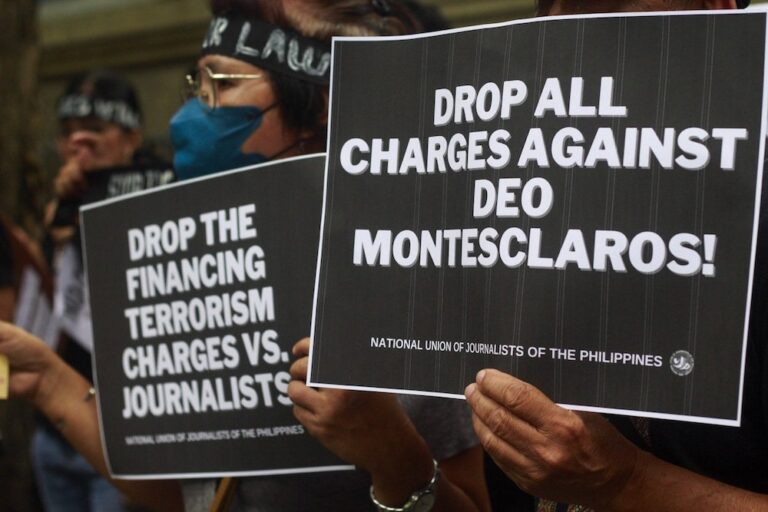The killing of journalists continued in the first year of the Aquino administration, and the prosecution of the alleged masterminds and killers has proceeded as slowly as it had under the Arroyo regime, CMFR notes.
(CMFR/IFEX) – 5 September 2011 – His supposed commitment to free expression and a free press was part of then Sen. Benigno Aquino III’s announced platform during his campaign for the Philippine presidency. Aquino promised to support and protect the free press, stop the killing of journalists (a widow of an Ampatuan massacre victim even spoke in one of his campaign advertisements), and prosecute the killers. Many media personalities and journalists supported Aquino for the presidency. They believed Aquino would deliver on his promises.
But the killing of journalists continued in the first year of the Aquino administration, and the prosecution of the alleged masterminds and killers has proceeded as slowly as in the Arroyo regime. As of July 25, when he delivered his second State of the Nation Address, the Center for Media Freedom and Responsibility (CMFR) had recorded four work-related killings, all during his first year in office.
The most recent killing is that of dwEB radio anchor Romeo Olea in Camarines Sur last June 13, a few days before Aquino celebrated his first year in power. Olea is the second dwEB staff killed during the Aquino administration. The first was dwEB “volunteer reporter” Miguel Belen. Belen was on his way home July 9, 2010 when a gunman shot him in Nabua, Camarines Sur. Belen’s case is the only work-related killing of a journalist during Aquino’s administration that has been filed in court. However, the trial proper has yet to start as the court is still hearing the petition for bail filed by the alleged gunman.
In the case of Palawan broadcaster and veterinarian Gerardo Ortega, who was killed on Jan. 24, the panel of investigating prosecutors dismissed the murder charges against the alleged masterminds. In a 21-page resolution dated June 14, the Department of Justice (DOJ) prosecution panel handling the Ortega case found insufficient evidence against former Palawan Gov. Joel Reyes, former Marinduque Gov. Bong Carreon, the mayor of Coron, Palawan, Mario Reyes Jr., lawyer Romeo Seratubias, Arturo Regalado, and Percival Lecias. The panel, however, found probable cause to file murder charges against Reyes’s alleged security aide Rodolfo Edrad Jr., Armando Noel, Dennis Aranas, and Arwin Arandilla. The Ortega family filed a motion for partial reconsideration last July 1. The said DOJ panel has yet to come out with its decision.
The murder of Marlina Flores-Sumera is also still at the stage of preliminary investigation.
Lack of outright policy against the killings
And yet in the first few months of his presidency, members of Aquino’s communication group and the justice secretary had met with journalists’ groups and media organizations to discuss how they can work together in the anti-impunity campaign.
In an August 2010 meeting at Malacañang, media groups like the Freedom Fund for Filipino Journalists (FFFJ) and the National Union of Journalists of the Philippines suggested policy options the Aquino government may want to adopt to give teeth to its commitment to end the killing of journalists in the Philippines. Some of the suggestions were: strengthening of the Witness Protection Program (WPP), rehabilitating the criminal investigation arms of law enforcement agencies, organizing multi-sectoral Quick Response Teams, and reviewing existing Rules of Court that have been used and abused to delay the prosecution of cases and court proceedings in general.
FFFJ is a coalition of six media organizations: CMFR, the Center for Community Journalism and Development, the Kapisanan ng mga Brodkaster ng Pilipinas (Association of Broadcasters of the Philippines), the Philippine Press Institute, the Philippine Center for Investigative Journalism, and the US-based Philippine News. It was founded in 2003 to assist in the prosecution of the killers of journalists and to provide humanitarian assistance to the families of slain journalists and media workers.
A year since Aquino assumed the presidency, the media groups that met with Aquino officials are still waiting for the president and his Cabinet to act on the needed steps agreed upon during the August 2010 meeting. In an open letter to Aquino dated April 17, the press, together with some University of the Philippines mass communication faculty and the campus journalists’ group College Editors Guild of the Philippines, reminded Aquino that “You were elected because the people were hungry for change, and you thwart that belief in the possibility of change at risk of the people’s loss of faith in the capacity of the system to deliver justice.”
They warned the president that: “(T)he failure to prosecute the killers of journalists as well as those of political activists . . . is sending the dangerous signal that, as in the administration of Gloria Macapagal Arroyo, the killings can continue during your watch without the perpetrators being punished. That failure will confirm that impunity will continue to reign and those with the means will not stop the use of violence against those they wish to silence.”


